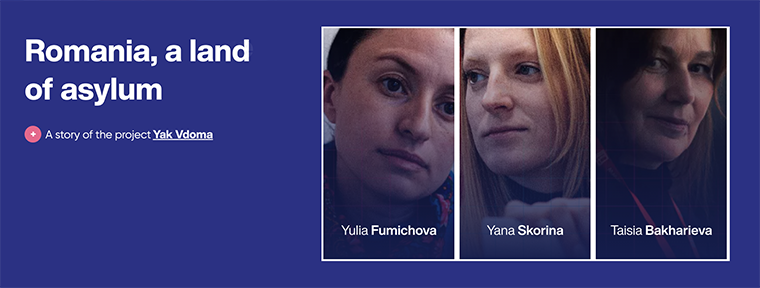Oksana Gryshyna's optimistic approach to rebuilding Ukraine
Oksana Gryshyna looks at what citizens and authorities are doing to put Ukraine back on its feet and rebuild the country. She derives unshakeable optimism from her country's resilience.
On 24 February 2022, Oksana summed up the situation pragmatically to her 13- year-old son: "The Russians outnumber us six to one, so all we have to do is be six times better than them and we'll be able to defend our country." A year later, he accompanied his mother to Bucharest for the second time, where he patiently attends his online lessons, sat not far from Oksana who has come to work for three months in the Yak Vdoma residence.
"The first time we came here was during the evacuation in the first month of the war, when we boarded the first train out of Ukraine without knowing where we were going, the idea was just to escape. Today, I'm here to work," explains the journalist from Kiev.
For 52-year-old Oksana, being six times better than the Russians means above all being resilient, and that's something the Ukrainians know how to do. "In fact, it's what differentiates us from the Russians. They arrive somewhere and create nothing but destruction to impose their way of seeing things. They don't know how to do anything else," asserts the journalist.
Wearing a sporty outfit decorated in colourful floral patterns, and a head of thick greying hair, Oksana's anger is palpable. So, she clings to history and the resilience that Ukrainians have always shown.
Resilience, a Ukrainian virtue
She speaks of a time when the Ottoman Empire made regular incursions into present-day Ukraine. "If we hadn't been able to pick ourselves back up again, we would never have survived. The Ottomans made no mistake: every 10 years there was something to take from us, and the Ukrainians rebuilt so well that after a few years they were producing and exporting to Europe."
For Oksana, there's no doubt that it's the same today: "People are moving forward, that's what being Ukrainian has always been about," she asserts proudly. But in her opinion, this is the last war. "The attacks will stop once this conflict is over," she confides with aplomb and conviction. "The Russians will never try to come back after this. The door will be closed to them for good," she prophesies.
Today, more than ever, it is this radiant future that Oksana evokes in her work. She shows us the Interfax Ukraine website, the press agency for which she conducts open access interviews. She used to write about renovating old buildings, and what makes a city an enjoyable place to live. Her last articles before February 2022 described the hotels in Kiev and how they are meant to delight tourists. It was another era.
Today, she tells of the besieged and bombed towns of Mykolaiv and Kharkiv, where the authorities and citizens are thinking about what comes next and urban redevelopment. She takes pride in the fact that the dialogue between elected representatives and residents on these issues is "truly democratic", in her own words, "because thinking about reconstruction helps Ukrainians psychologically, to project and comfort themselves in the idea that they're going to win."
Reconstruction, an opportunity to modernise outdated infrastructure
She also sees it as a tremendous opportunity. Oksana shows us her interview with the CEO of an Austrian company (ES Consulting) which has a reconstruction plan for Trostianets, a city very close to the Russian border. The title is clear: "Trostianets and its an exceptional opportunity to become a green and pleasant place for families." For Oksana, the country's reconstruction offers the opportunity to move towards a circular and greener economy.
The application registering requests from Ukrainians to rebuild their homes lists 320,000 requests. In Oksana's opinion, these figures are underestimated since "many people no longer have the deeds to their property because of the destruction. Others don't even know if their home has been destroyed or not."
Every day, Ukraine updates the number of buildings destroyed in the country: 22 million square metres of housing, according to the journalist. Oksana feels that her country must not miss this current turning point (illustrated by the windfall of European money, among other things), especially as investment was not a priority in previous decades.
“The situation was already bad before the war," explains Oksana. "Gas, water and electricity, for example, all dated back to the 1970s."
"According to estimates, 70% to 80% of our infrastructure was already dilapidated before the war. Now, everything has been fully destroyed in some regions," she adds.
There is a long way to go, and Oksana knows it. Proof can be seen in the Romanian situation, which she has been observing closely since arriving in Bucharest. Sixteen years after joining the EU, the country is still facing similar problems, such as difficulty heating (even in big cities), outdated networks, poor road infrastructure, and more.
But she is pleased that the current discourse in Ukraine is moving in the direction of greater local autonomy, with "independent infrastructure projects that are less interconnected, because we have seen that too much centralisation is a handicap." It would appear that Ukrainian experts have realised that each locality must be capable of self-sufficiency in the event of a crisis. Each region also has its own renovation and development plan.
And then there are the citizens, who are generally "the first to take action following the destruction," she assures us. She cites a friend, also a journalist, who goes out every weekend to clear debris from destroyed neighbourhoods. Oksana also mentions a particular Swedish company that has donated materials for 85 buildings to be rebuilt. "Ukrainian society is incredibly vibrant, and that's a good thing, because the needs are huge. More than 3 million people in the country have lost their homes," she concludes.

La situation était déjà en soi mauvaise avant la guerre, rappelle Oksana - pour le gaz, l'eau et l'électricité par exemple, tout date des années 70. « D'après les estimations, 70 à 80% de nos infrastructures étaient déjà vétustes avant la guerre. Or, là, dans certaines régions, tout est détruit à hauteur de 100 % », explique-t-elle. La route est donc longue, Oksana le sait bien. Elle en veut pour preuve la situation roumaine qu'elle observe avec attention depuis son arrivée à Bucarest : seize ans après son entrée dans l'UE, le pays se confronte toujours à des problèmes similaires (difficulté à se chauffer même dans les grandes villes, réseaux vétustes, infrastructure routière famélique, etc.).
Mais elle se félicite que le discours actuel en Ukraine aille dans le sens de davantage d'autonomie locale, avec « des projets d'infrastructures indépendants et moins interconnectés, car on a bien vu que trop de centralisation était un handicap ». Il semblerait que les experts ukrainiens aient pris conscience que chaque localité devait être capable, en cas de crise, d'être autonome. De plus, chaque région a son propre plan de rénovation et de développement.
Et puis il y a les citoyens et citoyennes, généralement « les premiers à s'activer suite aux destructions » assure-t-elle. Elle cite cette amie, journaliste elle aussi, qui se déplace chaque week-end pour enlever les débris dans les localités détruites. Oksana évoque aussi cette société suédoise qui a offert du matériel de construction pour 85 immeubles à reconstruire. « La société ukrainienne est d'une vitalité incroyable, et c'est tant mieux car les besoins sont énormes. Il y a plus de 3 millions de personnes qui ont perdu leur habitation dans le pays », conclut la journaliste.

